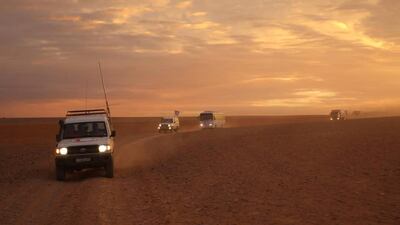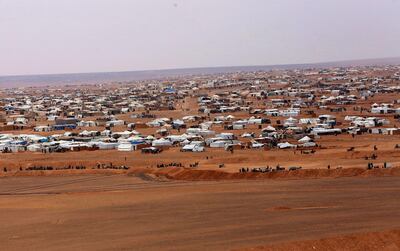Some Syrian civilians trapped inside a desert camp near the Jordanian border did not receive humanitarian supplies from a recent delivery of aid, a UN official told The National, despite humanitarian officials saying that the entire population had been served.
Meanwhile, Russian Health Ministry spokesman Sergei Grabchak on Friday said that more than one hundred people have died in the Rukban camp over the past month due to poor hygienic conditions and lack of medical assistance, according to the Russian TASS news agency.
A 78-truck convoy reached Rukban camp, which hosts as many as 50,000 people, with aid supplies between November 3 and 8 for the first time since January, UN humanitarian aid official Jan Egeland told reporters on Friday.
“[The convoy] was able to reach and deliver supplies, food, health items, sanitary items, water purification, health items, for all of the population for at least a month,” he said.
However, Fadwa Baroud of the UN office of the Resident Coordinator told The National, that not everyone has received assistance.
“The UN received reports from some families in Rukban that they did not receive the full amount of assistance they were entitled to or did not receive assistance at all,” she said.
The organisation is following up with the local administration and relief committee in Rukban to ensure all families receive the assistance, Ms Baroud said.
The UN said another delivery was planned by mid-December.
__________
Read more:
Rukban residents running out of food days after UN aid delivery
First aid since January reaches displaced Syrians near Jordan border: UN
Displaced Syrians trapped in Al Rukban border camp are facing starvation
__________
While Mr Egeland claims the aid is enough for a month, the assistance has proven to provide only a short respite and without regular and uninterrupted access, the plight of desperate residents in harsh weather conditions will only get worse as winter sets in.
Residents of the camp told The National that they were running out of food supplies just days after the aid was delivered.
"The situation inside the camp is still devastating even after the delivery of relief; we are running out of supplies," Emad Ahmed said.
Mr Ahmed said the supplies received were only enough for six days for a family of five and called for regular deliveries of aid.
The UN found no major security issues during the delivery of aid, including inside the camp, where community members facilitated the entry of the aid convoys and the work of the UN and Red Crescent teams.
“However, some armed groups were present inside the camp holding weapons,” Ms Baroud said.
Yury Tarasov, the Russian representative to the Geneva-based task forces on ceasefire and humanitarian issues, said on Friday that there are 6,000 militants based in the camp. He says they are mostly from the US-backed Maghawir al-Thawra rebel group.
"The whole responsibility for the outrageous situation in Rukban rests with the United States, as it occupies the territory illegally and it uses the humanitarian problems of the refugee camp to legitimize its military presence in the south of Syria," he told a joint session of Russian and Syrian committees tasked with returning Syrian refugees.
Mr Egeland on Friday said that there are “a handful of thousand armed men,” in the camp. He claims there are at least six armed groups- one big group, that really controls the inner perimeter of the camp, and five other smaller groups.
The UN is calling for international support to ensure continued and safe access to the camp so that lifesaving assistance can reach civilians there, she said.
The camp lies within a 55-kilometre so-called de-confliction zone set up by the Pentagon with the aim of blocking Iranian supply routes through the area into Syria, and preventing pro-regime forces from operating there.
The Syrian government and its ally Russia have blamed US troops stationed nearby for failing to provide security for aid shipments, allegations denied by the Americans.
Jordan closed the border over security concerns after a deadly attack there by ISIS in 2016, and it suspects the camp to be infiltrated by ISIS sleeper cells.
Last Thursday, Jordan said it was in talks with the US and Russia to empty the camp, seen as a move to defuse security tensions.
The UN estimates the total population to be up to 50,000 people.
“According to community leaders, in the past several months a few thousand people have managed to leave the camp through smugglers and some local sources inside the camp estimate the population to be closer to 35,000-40,000,” Ms Baroud said.



